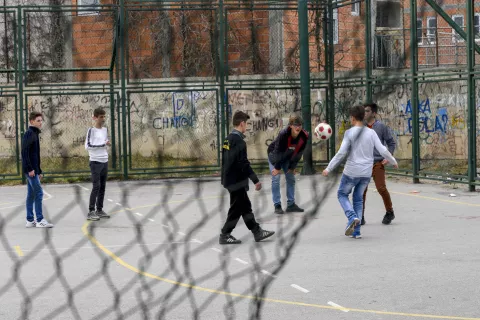Seven countries meet in Skopje to discuss progress for children in the Western Balkans and Turkey

- Available in:
- English
- Македонски
SKOPJE, 19 September 2018 – Over the next two days, representatives from Albania, Bosnia & Herzegovina, Montenegro, Serbia, Turkey and Kosovo * (UNSCR 1244)[1] have joined colleagues in Skopje at regional meeting to take stock of progress on European Union funded and UNICEF supported action to protect children from violence and promote social inclusion of children with disabilities.
“Violence against children is one of the most painful points in every society. However, violence can be prevented through a multi-sectoral response that addresses system gaps in the prevention and protection of children from violence, neglect and abuse. This meeting comes at a times when we are launching very important social sector reforms and the support of the European Union and UNICEF is important to help us to advance this agenda,” said Ms. Mila Carovska, Minister of Labour and Social Policy. “I am particularly pleased that as part of this regional project, Macedonia will be the first country in the region to introduce indicators for identifying children-victims of violence.”
In an effort to fight violence against children and promote social inclusion of children with disabilities,
UNICEF in Europe and Central Asia region, and the European Commission (EC) partnered to work together on a three-year Programme called ‘Protecting Children from Violence and Promoting Social Inclusion of Children with Disabilities in the Western Balkans and Turkey’.
“Child rights and disability rights are inherent rights and non-negotiable. We all have a duty to protect these fundamental rights in the work we do. The European Union and the enlargement agenda is based on fundamental rights, protecting children from violence and abuse, and combatting discrimination, inequalities and exclusion,” said Ms. Genoveva Ruiz Calavera, Director for Western Balkans, European Commission, Directorate General for Neighborhood and Enlargement Negotiations.
“Violence against children is not just a human rights issue, is an issue about social, economic and democratic development,” said Mr. Benjamin Perks, UNICEF Representative. “Many of the countries in the European Union now recognize what science has been telling us for years, that children who grow up with high levels of violence are much more likely to have bad life outcomes, exposed to exploitation throughout their life. The countries that have lower levels of violence have systematically tried to reduce violence by promoting positive parenting, by having legal frameworks and inventive services.”
Over the past three years, the seven countries have been working to empower civil society to better monitor the realization of children's right; to promote inclusive and innovative services; and to increase public support for the protection of children from violence and for social inclusion of children with disabilities.
Key achievements of the programme include:
1. Majority of the participating countries have made progressive step towards ensuring that all children are protected from different forms of violence by strengthening their legal frameworks and introducing practical mechanisms to implement these laws through national plans of action and national coordination.
2. For the first time, there is now valuable information gathered on the situation of children with disabilities in this region through Situation Analysis carried out in close collaboration with Disability Persons Organizations (DPOs).
3. Civil society (including DPOs), practitioners, parents and children have better knowledge and understand how to prevent violence against children and ensure realization of the rights of children with disabilities;
4. The previously fragmented DPOs movement in the participating countries have been strengthened to better advocate for the rights of children with disabilities as one voice,
5. Public services at local level have stronger instruments (protocols of cooperation, multi-sectoral cooperation) to work together to respond better to incidents of violence against children; they also strengthen data collection;
6. Has strengthened civil society in the participating countries to advocate to end violence against children and to promote social inclusion of children with disabilities through formal and informal networks and platforms.
Key programme partners have been the European Disability Forum (EDF) – the Disability Persons Organization (DPO) advocating for the rights of persons with disabilities at European level and in Member States; as well as the International Children’s Center (ICC), which serves as a secretariat of a platform of more than 70 civil society organizations in Turkey.
“Over this project we have seen there has been a seismic exchange of ideas and over these two days through elaborating key achievement, lessons learned and pointing to the way forward, we continue to expand the region of these ideas,” said Mr. John Patrick Clarke, Vice-President of the European Disability Forum.
“Over the past three years, this programme has provided us the opportunity to work jointly towards the same goals and created benefits for each other to advance the agenda for children,” said Ms. Işil Erdemil, Child Rights Programme Coordinator, International Children’s Center (ICC).
During the meeting, participants from the seven countries are discussing progress made within the scope of the regional action, share lessons learned and initiatives which have potential to become models for replication, identify common remaining challenges across the participating countries and strategies to address those beyond the Action.
Media contacts
About UNICEF
UNICEF promotes the rights and wellbeing of every child, in everything we do. Together with our partners, we work in 190 countries and territories to translate that commitment into practical action, focusing special effort on reaching the most vulnerable and excluded children, to the benefit of all children, everywhere.
For more information about UNICEF and its work for children, visit www.unicef.org.




